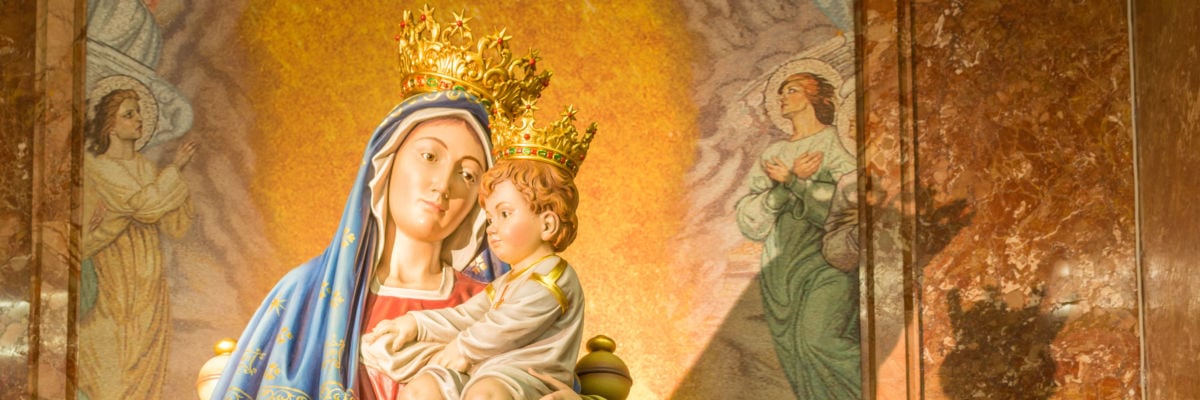
Homily for the Twenty-Seventy Sunday in Ordinary Time, 2021
And people were bringing children to him that he might touch them,
but the disciples rebuked them.
When Jesus saw this he became indignant and said to them,
“Let the children come to me;
do not prevent them, for the kingdom of God belongs to
such as these.
Amen, I say to you,
whoever does not accept the kingdom of God like a child
will not enter it.”
Then he embraced them and blessed them,
placing his hands on them.-Mark 10:13-16
Brothers and sisters:
He “for a little while” was made “lower than the angels, ”
that by the grace of God he might taste death for everyone.For it was fitting that he,
for whom and through whom all things exist,
in bringing many children to glory,
should make the leader to their salvation perfect through suffering.
He who consecrates and those who are being consecrated
all have one origin.
Therefore, he is not ashamed to call them “brothers.”-Heb. 2:9-11
What does it mean to say that he “who consecrates,” and we, “those who are consecrated,” have the same origin?
The answer is not far from us in the lessons of this Sunday’s Mass.
Angels and children have a close connection in their experience of the devout. In this they follow the example of the Savior himself. Today he tells us that the very kingdom of heaven, the dwelling of the angels, belongs to those who become as little children, and so his followers must accept the kingdom as little children in order to live with the angels.
This is a very personal matter for the Savior, and he approaches it with the zeal of an enthusiast for a new idea. And for him it was. The truth of the childlike life of heaven was new to him; it was an experience that he first had when “for us men and for our salvation he came down from heaven.”
Yes, as the eternal God he knew the unchanging plan that the Son would at a certain point of human history become man. He knew that it was his “destiny” to be the man Christ Jesus. But he had not experienced everything he knew. There was an instant, in his tiny infant existence, when he experienced in his human soul with its intellect and will, senses, imagination, and feelings what it was to be the eternal Son and the son of Mary.
In that infant instant he conceived in his Sacred Heart such a love for our human nature that it was his sole and consuming passion to unite each of us to himself.
His human memory of that moment was his constant joy and driving realization and motivation. He experienced for himself that he, who is the very definition of “the kingdom of heaven,” was the first human being to enter there. That is why the epistle to the Hebrews says that he immediately, on coming into the world, told his Father, “A body you have made for me. Behold, I come to do your will, O God” (10:5-7).
Think of this. Heaven was his always as God, but it was now also his as one of us. He is its king, its proprietor, its Lord—and his fellow human beings are meant to join him in this kingdom.
But since he, with his vision of this Father granted to his human soul, was the only man yet there, he brought the just into his kingdom on Holy Saturday and at his Ascension. Consider the immense application and enthusiasm of his Heart to give to everyone what he had so uniquely experienced and alone could give to others.
Any good person likes to share the good things he has with others, We see this in the zeal of lovers to be joined in marriage, of fathers and mothers to foster new life, of instructors and teachers to impart knowledge, of healers to heal, of servants to serve.
In the first instant of his existence, the child Jesus possessed the kingdom of heaven. Those little children reminded him of the grace he had beyond all graces, and so he was indignant at anyone who would keep them from him who was the kingdom in person.
Little children are carefully taught to share with others. Sharing good things is the most evident sign of holiness in any person, divine, angelic, or human. The Lord Jesus was the holy Child, infinitely generous, sharing of his goods. He wants us to be as he was and is.
We are his brothers by grace, and so we are meant to possess our inheritance with him. We have the same Father. What a moment, when the Son of God, in a human thought, said to himself, “I am the Son of God”! And then began to gather his children then as now, embracing them and blessing them.
May we all know his embrace and blessing and extend it to others as his fellow children in the kingdom of heaven.



